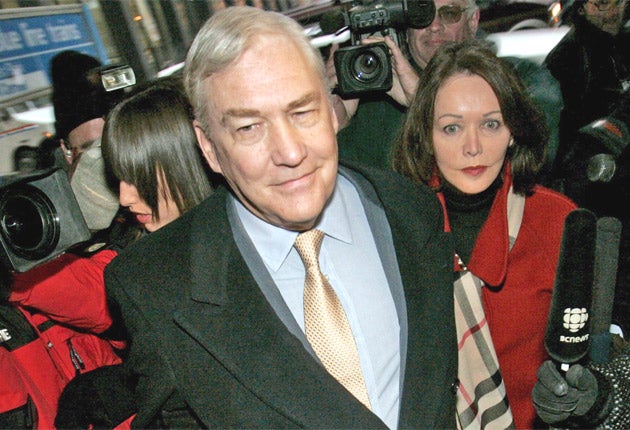Friend puts up $2m bail to secure Black's release

Some 870 days after he was incarcerated in a Florida jail, the flamboyant press baron, Conrad Black, former proprietor of The Daily Telegraph and peer of the realm, has been freed on bail.
A prison spokesman confirmed that Lord Black left the Coleman Federal Prison in central Florida yesterday afternoon. He slipped away without being spotted by reporters but they caught up with him at his oceanside mansion in Palm Beach. A financier friend of Lord Black put up a $2m (£1.3m) bail bond to secure his release, after the US Supreme Court raised questions about the fraud charges of which the Canadian-born peer was convicted three years ago.
Lord Black was sentenced to six-and-a-half years in jail for embezzling millions from his media company, and on a further count of obstruction of justice, but he has continued to protest his innocence from the Coleman correctional facility near Orlando, Florida.
His wife, columnist Barbara Amiel, was in Florida yesterday. The details of her husband's release had been decided 1,000 miles away in Chicago in the same courthouse where he was tried for three months in 2007. The judge, Amy St Eve, ordered that he appear there tomorrow to finalise additional conditions on his bail.
It was not clear where the couple will settle while Lord Black awaits an appeals court ruling on his convictions or a retrial. The Palm Beach mansion they shared is owned by a finance company and must be sold by September.
Judge St Eve said she wanted to know the state of Lord Black's finances before ruling on whether he will be allowed to leave the US. The bail bond was posted by New York businessman Roger Hertog, and the court was told Lord Black will most likely stay at a New York hotel if he must remain in the country.
The media mogul's chance to partially clear his name comes after the Supreme Court ruled that a key part of the advice often given to juries in white-collar trials will no longer be admissible. Jeff Skilling, the former boss of the collapsed energy giant Enron, was also covered by the ruling.
The Daily Telegraph was the jewel in the crown of an international media empire. But he was forced to sell the company in 2004 as investors rebelled, saying he and his wife were using it like a piggy bank. A report commissioned by the company after he was forced out described a "corporate kleptocracy" that let him loot $400m from the firm. The fraud charges on which he was convicted covered a fraction of that – around $3.5m that Lord Black and three colleagues had skimmed from inserting bogus clauses into business deals.
Subscribe to Independent Premium to bookmark this article
Want to bookmark your favourite articles and stories to read or reference later? Start your Independent Premium subscription today.

Join our commenting forum
Join thought-provoking conversations, follow other Independent readers and see their replies